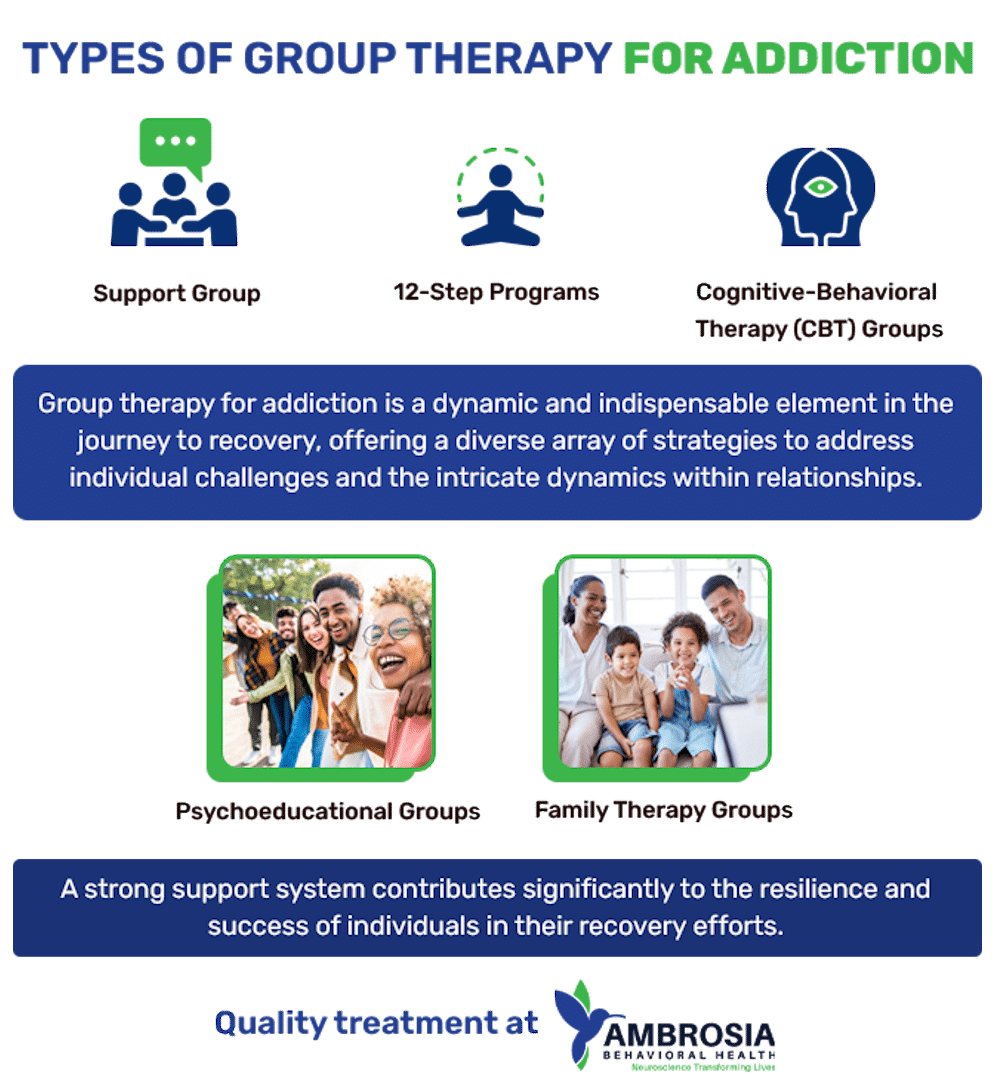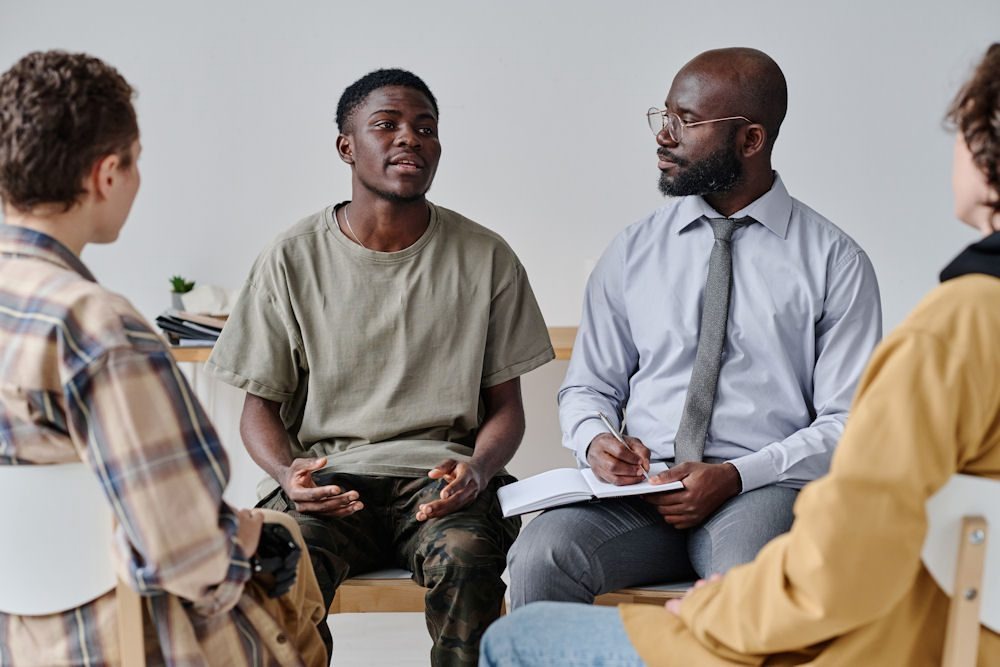Group Therapy For Addiction
What Is Group Therapy?
Group therapy is a form of psychotherapy where a trained therapist facilitates discussions among a small group of individuals facing similar challenges. It provides an inclusive environment for members to share experiences, gain insights, and receive feedback. The group dynamic fosters a sense of belonging and helps participants develop coping strategies.
Ambrosia Behavioral Health is a mental health service provider that may offer group therapy as part of its comprehensive approach to treatment. Specializing in behavioral health, we aim to address a range of mental health issues through evidence-based practices.
Our team of qualified professionals may utilize group therapy sessions to enhance interpersonal skills, build a sense of community, and provide a platform for individuals to explore and address their mental health concerns collaboratively. The group setting at Ambrosia Behavioral Health may offer a diverse and supportive space for individuals on their journey to mental well-being.
Let’s take a closer look at the various functions and benefits that group therapy for addiction provides for its participants.
How Does Group Therapy Work?
The therapist, specializing in addiction treatment, facilitates discussions, employs various therapeutic techniques, and fosters a safe environment for recovery. Members benefit from shared insights, diverse perspectives, and addiction-focused skill-building exercises.
Confidentiality is maintained to create a secure space for open communication. The group dynamic in addiction-focused group therapy enhances accountability, promotes sobriety, and facilitates the exploration of underlying issues contributing to addiction.

Types Of Group Therapy For Addiction
These groups create a compassionate space for individuals to share experiences, providing empathy and understanding.
– Participants benefit from a sense of community and shared wisdom, combating the isolation often experienced in addiction.
Grounded in principles like surrender, accountability, and spiritual growth, these programs guide participants through a structured path to recovery.
– The group setting reinforces a collective commitment to sobriety, providing a supportive framework for individuals navigating the challenges of addiction.
CBT groups focus on changing thought patterns and behaviors contributing to addiction, employing evidence-based techniques.
– Participants learn practical skills to manage triggers, identify distorted thinking, and develop healthier coping mechanisms.
These groups provide valuable information on addiction, relapse prevention, and essential life skills.
– Education enhances participants’ understanding of the physiological and psychological aspects of addiction, empowering informed decision-making.
Family Therapy Groups- Involving loved ones in the recovery process, these groups address the broader impact of addiction on relationships and family dynamics.
– Participants gain insights into communication patterns, rebuild trust, and work towards a healthier, supportive environment.
What Are The Goals And Principles Of Group Therapy For Addiction?
The primary goal is to provide a safe space where participants can share their experiences, challenges, and successes related to addiction. The group aims to reduce feelings of isolation and stigma through shared insights and perspectives, promoting a sense of belonging.
Principles include the promotion of accountability, emphasizing individual responsibility for one’s recovery journey. Additionally, the group setting facilitates the development of interpersonal skills, improving communication and relationship dynamics.
Encouraging empathy and mutual support, group therapy aims to break down barriers and reduce judgment, creating a non-judgmental atmosphere. Ultimately, the overarching principle is to empower individuals with the tools, insights, and connections necessary for sustained recovery while building a supportive community within the group setting.
Benefits Of Group Therapy For Addiction
 Group therapy for addiction offers numerous benefits, enhancing the recovery journey through a supportive communal framework. Firstly, the shared experiences within group therapy foster a sense of belonging and reduce the isolation often accompanying addiction struggles.
Group therapy for addiction offers numerous benefits, enhancing the recovery journey through a supportive communal framework. Firstly, the shared experiences within group therapy foster a sense of belonging and reduce the isolation often accompanying addiction struggles.
The diverse perspectives of group members provide varied insights, expanding individuals’ understanding of their challenges and solutions. The group dynamic instills a collective commitment to sobriety, reinforcing accountability and motivation.
Furthermore, group therapy facilitates the development of crucial interpersonal skills, improving communication and relationship-building abilities. Participants receive guidance from trained therapists and gain valuable support and encouragement from peers who can relate to their experiences. The sense of community and mutual understanding promotes empathy, reducing stigma and judgment.
Overall, group therapy for addiction creates a space where individuals can openly explore their struggles, share coping strategies, and receive both professional and peer support, fostering a comprehensive approach to recovery.
How Is Group Therapy Helpful In Drug And Alcohol Addiction Recovery?
- Shared Understanding- Participants share experiences, reducing isolation and creating a sense of community.
- Diverse Perspectives- Varied insights from group members enhance understanding of personal challenges and solutions.
- Collective Accountability- Reinforces a commitment to sobriety, fostering individual and group accountability.
- Interpersonal Skill Development- Facilitates improved communication and relationship-building skills crucial for sustained recovery.
- Mutual Support- Participants receive encouragement and peer support from both trained therapists and peers who can relate to their experiences.
- Reduced Stigma and Judgment- Promotes empathy, breaking down barriers, and creating a non-judgmental atmosphere.
- Comprehensive Approach- Provides a holistic framework for recovery, addressing emotional, social, and psychological aspects.
- Safe Exploration- Creates a safe space for individuals to explore their struggles, share coping strategies, and receive professional and peer support.
Importance Of Support During Recovery
The encouragement and validation received from a support network boost self-esteem and motivation. Support facilitates accountability, helping individuals stay committed to their recovery journey. Additionally, it offers practical assistance in navigating obstacles, creating a safety net for individuals during vulnerable moments.
Overall, a strong support system contributes significantly to the resilience and success of individuals in their recovery efforts.
How To Find The Right Addiction Counselor Or Group Therapy Session
- Assess Personal Needs- Identify specific issues and preferences, such as counseling style, specialization, or group dynamics, to align with individual needs.
- Research Credentials- Ensure the counselor or group therapy facilitator holds relevant certifications, qualifications, and experience in addiction counseling.
- Seek Referrals- Ask for recommendations from healthcare professionals, friends, or family who have experience with addiction counseling or group therapy.
- Check Reviews- Utilize online platforms or testimonials to gauge the experiences of others with potential counselors or group sessions.
- Verify Specialization- Confirm that the professional or group specializes in addiction treatment, as this ensures expertise in addressing substance abuse issues.
- Visit Treatment Centers- Explore local treatment centers or clinics offering counseling services, as they often provide information about available resources.
- Inquire About Approach- Understand the therapeutic approach used by the counselor or group, ensuring it aligns with individual preferences and values.
- Consider Accessibility- Evaluate the location, schedule, and cost of sessions to ensure practicality and sustainability in the long term.
- Initial Consultation- Schedule an initial consultation to assess personal comfort, connection, and communication with the counselor or group facilitator.
- Evaluate Group Dynamics- Attend a trial session for group therapy to gauge the dynamics and determine if it resonates with personal goals and preferences.
Learn More About Our Therapy Services At Ambrosia Behavioral Health

Discover comprehensive therapy services at Ambrosia Behavioral Health, where our dedicated professionals prioritize your mental well-being. Our therapy offerings encompass individual counseling, group therapy, and specialized programs tailored to diverse needs.
Whether you’re seeking support for addiction, mental health challenges, or personal development, our team is committed to providing evidence-based and compassionate care.
Contact us today to embark on your journey toward positive change and emotional wellness. Reach out for a confidential consultation, and let our experienced therapists guide you to a path of healing. Take your first step towards a healthier and sober life. Your well-being is our priority.

Dr. Alam is an internationally renowned psychiatrist with academic affiliations with Northwestern University and University of Illinois, Chicago where he completed his residency training. He has been a principal investigator for over forty studies and has been involved in research leading to the approval of most psychiatric medications currently on the market. He is the founder of the Neuroscience Research Institute which continues to conduct research on cutting edge medication and interventional psychiatry. Dr. Alam is a Distinguished Fellow of the American Psychiatric Association and the American Society of Addiction Medicine. He has won several awards and has been featured extensively on radio and television.


